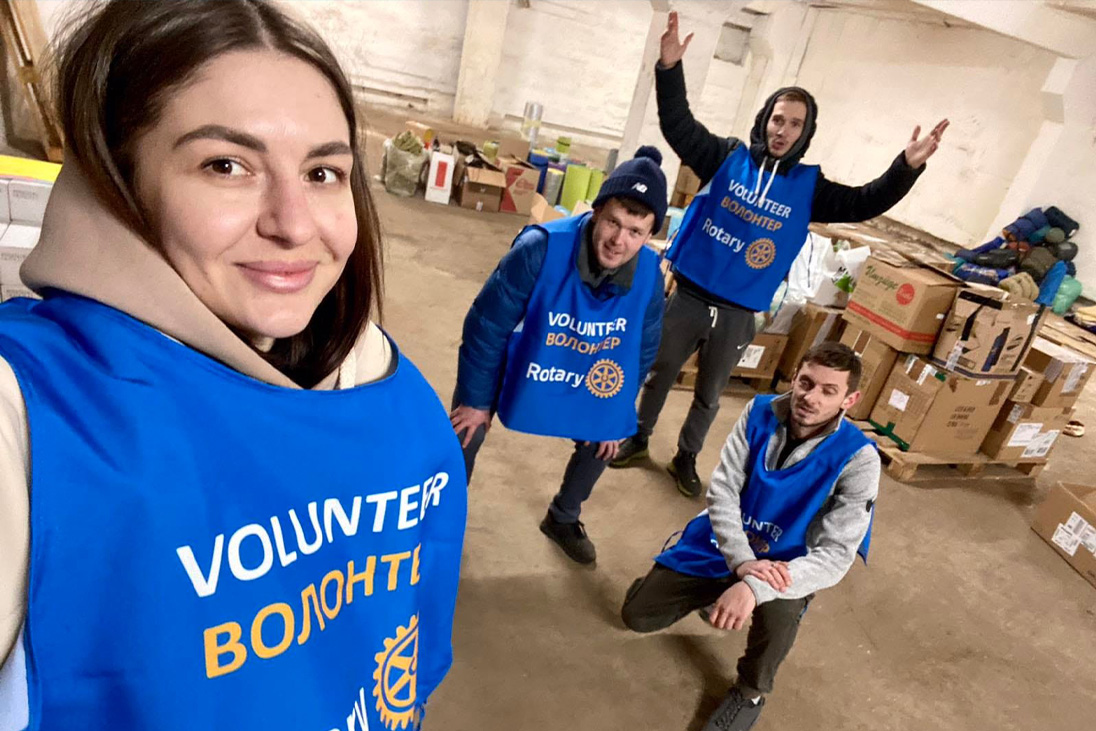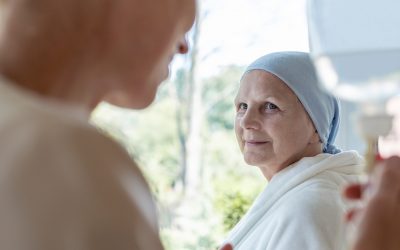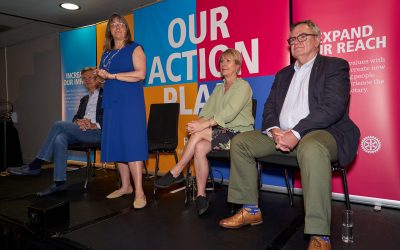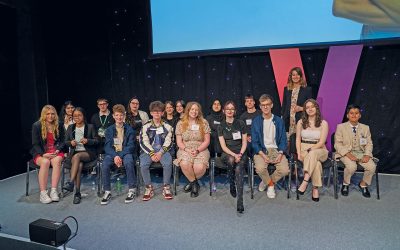One of the unique qualities of Rotary is its connectivity. That ability, through a common bond, to come together and make things happen.
So far in Great Britain & Ireland, Rotary clubs have raised up to £3.5 million in goods and donations sent to Ukraine.
Listen to this article
The ICC could be easily misrepresented as a global cricketing body, when it reflects, instead, the work of Rotary’s Inter-Country Committees.
James Onions from Kew Gardens Rotary, in the London Borough of Richmond upon Thames, heads up the body in Great Britain & Ireland.
“The ICC is an enabler of Rotarians doing things together,” he explained. “So when there’s a crisis, there are some go-to people who can make it happen.”
James is working directly with Rotary clubs and districts to send funds direct to areas of need.
That need is being identified by Rotarians in Ukraine and bordering countries, such as Moldova, Poland and Romania.
He cites the example of Yeovil Rotarian and doctor, Michael Fernando, who identified an urgent need for clean water just weeks after the war in Ukraine.
The clubs and districts have done a very good job raising money and transmitting money to where it is needed.”
Working with the ICC, the Water, Sanitation and Hygiene Rotary Action Group and Rotarians on the ground, work began with UNICEF to remedy the situation.
James explained that in Great Britain & Ireland, their focus has been working with poorer countries in the region such as Moldova, Romania and Bulgaria where refugees are heading to.
“The fact that we had ICCs in place has enabled us to move quickly to make contact with Ukraine, understanding some of their requirements and begin to fulfil them,” he said.
“Moldova is the poorest country in Europe. It has got about 100 Rotarians and eight clubs. We are working with them as they are looking after 5,000 of the 90,000 refugees in Moldova.
“The Rotarians have partnered with a Spanish charity called Jeunes, who are providing goods from Spain to Moldova, and we have been paying for the transport costs.
“The goods include non-perishable food, baby goods, hygiene products and medicines. Each consignment is worth around €100,000 and, so far, we have helped with six shipments – each shipment costs us around €7,000.”
The ICC is also working closely with Rotaract across Europe. At the start of the conflict, Rotaract Europe worked to get visiting students and young people safely out of the war zone to border countries.


That need for aid is being identified by Rotarians in Ukraine and bordering countries, such as Moldova, Poland and Romania.
Interact is also active in border countries. In Romania and Moldova, they add normality to the lives of young Ukranian people by spending time with them.
But for James and the team, he believes their work has only just begun, and there will be a need for more funding to support their work.
“There is still a lot of emergency work to be done,” he added.
“Whether that be water, medicine, shelter or even reconstruction, there will be a need for that emergency work to continue for as long as the war continues, and probably for a while longer.
“One of the big issues is refugees and my gut feeling is that Rotary can help a lot here. In Moldova, we’re talking to 5,000 refugees. Rotarians are supporting them with aid. Rotarians are going there talking to them.”
One of the clear consequences of Rotary’s work in eastern Europe, even at this early moment, is the esteem which the organisation is held in.
“We have now become the mouthpiece for medical issues in Ukraine,” said Dr John Philip, Chairman of the International Rotary Fellowship of Healthcare Professionals.
So far in Great Britain & Ireland, Rotary clubs have raised up to £3.5 million in goods and donations sent to Ukraine.”
James Onions points out a meeting they held with UNICEF recently to discuss water and sanitation in Ukraine.
“You could see that UNICEF were resource-hungry, but they had not thought of working with Rotary,” he explained.
“UNICEF realised they would work with a network of a thousand Rotarians across Ukraine to help make their work succeed.”
James added: “As Rotarians, we have enabled a lot of things to happen. We have empowered individuals and Rotary in those countries to do more than they would otherwise have been able to do.”
Allan Smith, head of the Rotary Ukraine Taskforce agreed. “I think we are making a significant contribution, far greater than we had envisaged.
“The clubs and districts have done a very good job raising money and transmitting money to where it is needed.
“They have also sourced a lot of goods, products which they have managed to transport to Ukraine and bordering countries. So I have been very heartened.
“It’s been Rotary getting its hands dirty and achieving. If we hadn’t been here, I think there would have been a gap in the market.
“We have huge credibility because we are Rotary in Great Britain & Ireland and we speak with one voice.
“We’re not finding that across the world, but we are focused and this has earned Rotary a lot of respect.”


























































